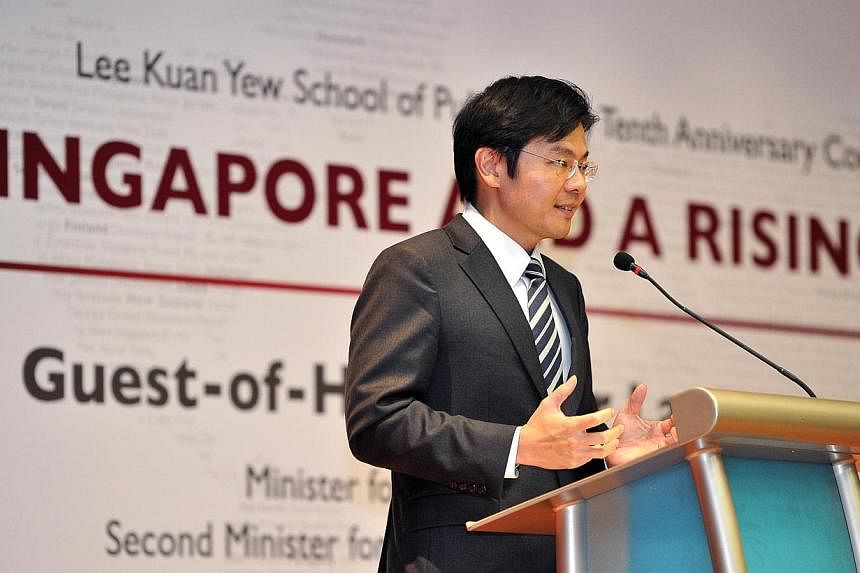SINGAPORE - Singapore should strive to be a society which works on and values integrity and deeds, and where citizens are actively involved in finding solutions that will improve the country, Minister of Culture, Community and Youth Lawrence Wong said on Friday .
For Singapore to get the next phase requires the effort of all Singaporeans.
"The government will support, encourage and lead the rally - but it comes down to whether Singaporeans believe that this nation is worth striving for. Each of us must recognise the value, as well as the fragility, of what our people have worked so hard to build," Mr Wong said at the launch of two books at the 10th anniversary conference of the Lee Kuan Yew School of Public Policy.
Noting that the world was far more competitive and that there is a need for fresh ideas to stay ahead of the curve, he said that Singapore had not reached the limits of its potential as a nation.
But there were many challenges in the process, including that of continuing to creating equal opportunities, and deciding on how best to spend revenue from taxes, for instance.
Mr Wong said it would not be useful to think of the government as a separate entity from the people, with its own source of funds: "Rather, government is about the things we decide together as a people. Through fiscal policy, we contribute money into a central pot through taxes and we spend that money to give expression to the shared values we wish to promote."
The challenges which Singapore faces as it aims to move forward and build a stronger and more cohesive society, are not unique. And these challenges have become all the more greater for several reasons - including the impact of globalisation and technological innovation, and the ease in which radical propaganda and inflammatory remarks can circulate online.
"Countries around the world are confronting very similar issues. This is at least partly why we see the rise of populist movements everywhere, tapping on widespread social discontent, as well as nationalist and xenophobic sentiments, to mobilise the masses," he said at the event.
"As a result, politics in many mature first-world democracies are now more fractured, chaotic and unpredictable than they were just two or three decades ago."
Pointing out that Singapore was not immune to pressures, he cited the example of the debate on the population when groups, which he did not specify, called for "zero foreign worker growth".
This made for a good slogan, he said. But it ignored the consequences that such a move would have on the economy, local businesses, and Singaporean jobs.
"Opposition for the sake of opposition will not promote or strengthen our democracy ... But how does this sort of discourse help us in solving the real and vital problems affecting our nation?" he asked.
"This goes beyond partisan politics. It's about the kind of democracy we want to be, and that I hope we can be - a democracy of integrity, and a democracy of deeds, made up of an active citizenry who get involved in developing solutions for a better society."
Mr Wong called on all Singaporeans to play their part.
Academics and intellectuals, for example, should present "the full complexities and trade-offs of the challenges that lie ahead for Singapore". These include on issues such as population, immigration, the income gap and social spending.
"A detailed exposition of the policy options we face in confronting these issues may not get as much publicity as a polemical essay. But it will go much further in strengthening our democracy of deeds," he argued.
The books launched yesterday were "The Big Ideas of Mr Lee Kuan Yew", a book that is a compilation of 10 essays from a conference held by the school last year to mark the former prime minister's 90th birthday.


